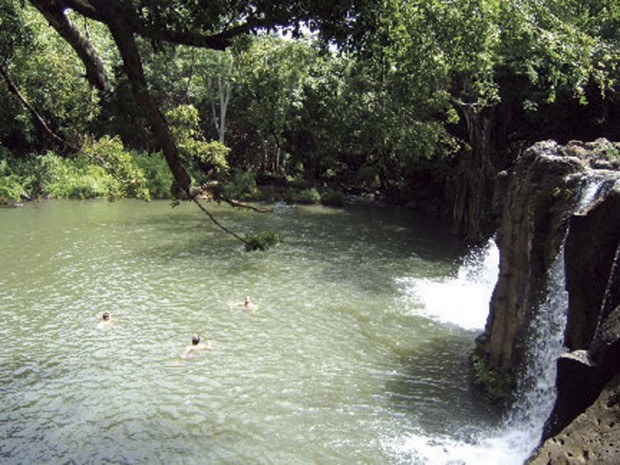LIHU‘E — Two bills moving through Senate and the House could change the entire travel writing business in Hawai‘i. SB 1208 and HB 552 require authors and publishers of travel publications that encourage readers to trespass to access an attraction
LIHU‘E — Two bills moving through Senate and the House could change the entire travel writing business in Hawai‘i.
SB 1208 and HB 552 require authors and publishers of travel publications that encourage readers to trespass to access an attraction to be held liable for injuries sustained by the reader on such property.
“You won’t be seeing any more books about Hawai‘i from Mainland publishers because they’re going to be terrified about this bill,” said Andrew Doughty, co-author of The Ultimate Kaua‘i Guidebook.
Rep. Jimmy Tokioka, D-Lihu‘e-Koloa, co-introducer the House bill, said the bill addresses publications that encourage people to go to dangerous places such as Kipu Falls, in Puhi, knowing that to get there the readers will have to walk through private property.
Kipu Falls has been the site of many serious injuries and deaths. The last person to die there was in December, when a 26-year-old O‘ahu visitor drowned after diving off the falls.
“They’re sending innocent tourists there that don’t know any better, they’re not giving proper notification,” Kaua‘i Visitors Bureau executive director Sue Kanoho said.
Sen. Ron Kouchi, D-Kaua‘i, said the concern is about the publications that encourage people to break the law.
“Some of the guide books say that all of the locals disregard the no-trespassing signs,” said Kouchi, who co-introduced the Senate bill.
“Every visitor that goes in there is trespassing,” said Kanoho, adding that she’s not asking that publications be re-called.
“We’re asking, moving forward, guide books that send people to places that they’ve been told not to send people to because it’s private property could be held liable,” Kanoho said.
She said she has written to all the guide books and shared with the them her “pet-peeves,” asking them not to send tourists to Kipu Falls or Queen’s Bath, in Princeville, because those are dangerous sites.
“The visitors tell me ‘the guide book told me to go there,’ and when people get hurt or die, they ask us ‘why did you allow this to happen?’” Kanoho said.
“First and foremost about Kipu Falls, it’s trespassing,” she said. “Legally nobody should be in there without permission, and permission has not been given.”
Kouchi, who served five years ago on the KVB board, said the organization had approached in 2006 publishers and authors, and asked them to remove those references from their publications because of the accidents.
“We were unsuccessful in getting them to voluntarily comply,” said Kouchi, adding that the intent of the bill is making the authors and publishers responsible for sending people to those sites.
“It’s for author or publishers who encourage the reader of that guide book to disregard the law,” Kouchi said.
Doughty said the bill is written in a way that touches a much broader issue, land-ownership.
“The way the law is written … basically you may do nothing that attracts or entice people to go to a place. It’s not a matter of encouraging somebody to trespass,” said Doughty, noting that even a picture of a place would be considered enticing.
A coffee-table book with a picture of somebody surfing Jaws, on Maui, could be considered enticing, Doughty said. If someone died surfing Jaws, a dangerous big-wave riding spot, then the author or publisher of that book could be sued if the surfer trespassed private property to get to Jaws.
“Maybe that’s not what you mean, but that’s what it says in the bill,” Doughty said.
The authors of the bill may be frustrated about the accidents, Doughty said, but they do not understand how travel writing works.
“From a travel writer standpoint, land ownership and trying to figure out where you belong and where you don’t, is a baffling and very difficult issue when you’re trying to write about Hawai‘i. It is not as cut and dry as it seems,” Doughty said.
Someone could get hurt in a given place, order every travel book listing such place and claim that those books were in his or her car, Doughty said.
“Now you’re going to have a lawyer who is going to have a whole huge list of targets that they can go after, hoping they can shake money out of somebody, it’s terrifying,” Doughty said.
The consequences of the actual language in the bill would be “devastating” to travel writing, according to Doughty.
“It’s important to look at the actual language that they use in the bill,” Doughty said. “What they describe as tourist guide could be anything, even a pamphlet. Anything could be considered a tourist guide, and trespassing is redefined.”
Doughty said he has been meeting with legislators to discuss the bills. Despite his criticism of the bills, he said he believes in a solution to everyone’s satisfaction.
Kouchi can be reached at (808) 586-6030 and Tokioka can be reached at (808) 586-6270.
Go to www.capitol.hawaii.gov for more information.
• Léo Azambuja, staff writer, can be reached at 245-3681 (ext. 252) or lazambuja@kauaipubco.com.


